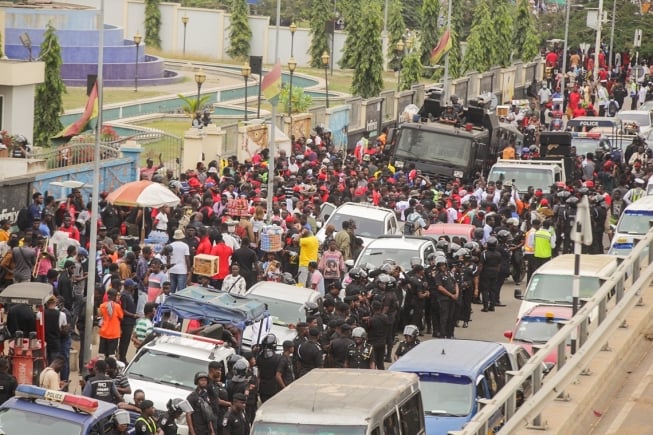The streets of Accra, Ghana’s capital, surged with a sea of protestors clad in the red, white, and blue of the opposition New Patriotic Party (NPP) on a Tuesday marked by discontent. Under the evocative banner of “Yɛn Suro Ahunahuna,” meaning “We are afraid of injustice,” hundreds of NPP supporters mobilized to express their mounting frustration with the perceived targeting of their party members. The demonstration, a potent display of public dissent, was organized to denounce what the NPP characterized as a systematic campaign of harassment, intimidation, and unjust treatment orchestrated by state institutions. Their grievances painted a picture of partisan persecution, claiming that the machinery of the state was being wielded to silence and suppress political opposition.
The march commenced at the bustling Obra Spot at Kwame Nkrumah Circle, a significant landmark in the heart of Accra. From this central point, the throng of protestors moved en masse towards the headquarters of the Ghana Police Service, the very institution at the center of their accusations. The destination held symbolic weight, representing the NPP’s intention to directly confront the perceived source of their grievances. The culmination of the march was to be the presentation of a formal petition to the Inspector-General of Police, Christian Tetteh Yohuno. This petition, a carefully constructed document, was intended to articulate the specific instances of alleged harassment and injustice, providing concrete examples of the NPP’s claims. It served as a formal record of their dissent and a direct appeal to the highest authority within the police force to address their concerns.
The NPP’s accusations encompassed a wide range of alleged abuses of power. They claimed that party members were being subjected to unwarranted arrests and detentions, often on flimsy or fabricated charges. These actions, they argued, were designed to intimidate and silence dissenting voices within the political landscape. Furthermore, the NPP alleged that state institutions were being used to selectively target their businesses and livelihoods, crippling their economic activities and undermining their ability to support their families. This economic pressure, they contended, was another tactic employed to stifle political opposition and maintain a grip on power.
Beyond the specific instances of alleged harassment, the NPP’s protest also reflected a broader concern about the erosion of democratic principles and the rule of law in Ghana. They argued that the actions of state institutions were creating a climate of fear and repression, where freedom of expression and political dissent were being systematically curtailed. This, they warned, posed a grave threat to the very foundations of Ghana’s democracy, a system built on the principles of fairness, justice, and respect for human rights. The protest, therefore, was not merely about individual grievances; it was a call to defend the democratic ideals upon which the nation was founded.
The “Yɛn Suro Ahunahuna” protest served as a powerful reminder of the importance of a vibrant and independent civil society in holding power accountable. The NPP’s decision to take to the streets, to publicly voice their dissent, underscored the crucial role of peaceful protest in a functioning democracy. By mobilizing their supporters and presenting their grievances directly to the authorities, the NPP aimed to draw attention to the perceived injustices and to demand accountability from those in power. The protest also highlighted the vital function of a free press in documenting and disseminating information about such events, enabling the public to stay informed and engaged in the political discourse.
The aftermath of the “Yɛn Suro Ahunahuna” protest remained to be seen. Whether the petition presented to the Inspector-General of Police would lead to meaningful action remained an open question. However, the demonstration itself served as a significant moment in Ghana’s political landscape, highlighting the ongoing tensions between the ruling party and the opposition. It underscored the importance of vigilance in safeguarding democratic principles and the crucial role of citizens in holding their government accountable. The protest’s long-term impact on the political discourse and the future trajectory of Ghana’s democracy would unfold in the days, weeks, and months to come. The echoes of “Yɛn Suro Ahunahuna” resonated beyond the streets of Accra, serving as a potent reminder of the ongoing struggle for justice and fairness in a nation grappling with its democratic ideals.














